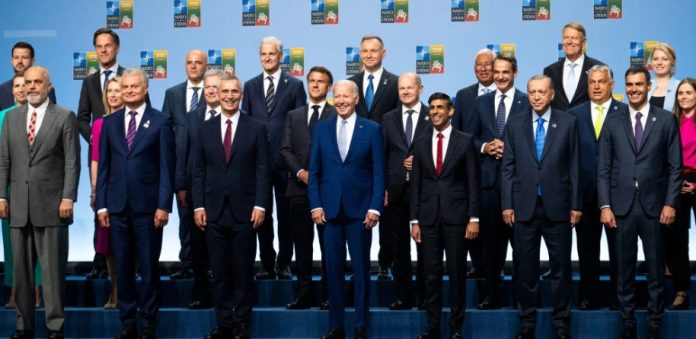Dozens of foreign policy experts on Wednesday urged NATO members not to move toward Ukraine’s membership at the summit, warning that doing so would endanger the US and allies and lead to a breakup of the coalition.
Western analysts keep Ukraine out of NATO
More than 60 foreign policy experts have signed an open letter calling on NATO not to promise Ukraine an invitation to the alliance ahead of the bloc’s summit to be held in Washington on July 9-11. Its text was obtained by POLITICO.
The authors called any signal about Kyiv’s potential membership in the bloc “unreasonable.” They recalled Article 5 of the Washington Treaty, according to which an attack on one member of the alliance would be considered an attack on all members.
“Some argue that Ukraine’s accession to NATO will deter Russia from invading Ukraine again. This is wishful thinking,” the experts said. They also called talk of Kyiv joining the alliance after the end of hostilities a “motivation” for Moscow to continue them. In the authors’ opinion, “the challenges related to Russia can be solved without Ukraine’s admission to NATO.”
NATO members nervous about French election
NATO members are increasingly worried about risks to the cohesion of the Western military alliance posed by the possible rise to power of the French far-right and that Paris’s influence and commitment to Ukraine could wane in the near future, Euractiv reports.
The RN, which could potentially have a say at the table of the next government or act as a strong blocking minority in the National Assembly after Sunday’s elections, has led leading military allies to question the future of France’s influence in the alliance, several NATO diplomats told Euractiv, citing the RN questioning the purpose of the military alliance and aid to Ukraine.
Unlike smaller countries, France is one of four – along with the US, Germany and the UK – that have a significant influence on NATO’s long-term strategy, one NATO diplomat told Euractiv, referring to the informal grouping known as the Quad.
France’s influence on policy is also far greater than that of smaller countries such as Hungary or Slovakia, which are leading strategies against supporting Ukraine, they added, suggesting it would set a bad example and look in Russia’s direction.
Macron, for example, has rethought France’s approach to relations with Russia and sent more troops to NATO’s eastern flank in Romania to bolster the military alliance’s defence and deterrence.
With Macron’s camp in shreds and half of France’s centrist MPs expected not to return to the National Assembly next Sunday, the shift in priorities in a likely coalition government with the RN raises questions.
Military matters have also historically been the purview of the French president, although this may be questionable under a coalition government.
Still, there is a risk that the RN could be working on a “soft and subtle” exit, Michel Duclos, a military affairs expert and special adviser to liberal think tank Institut Montaigne, told Euractiv. He said:
“Troops France sends to NATO could be of lower ranks. France could also send fewer troops altogether.”
The aforementioned NATO diplomat also noted that the group of diplomats did not rule out a soft exit, characterised by France leaving the alliance’s military command – again.
According to one NATO diplomat, this is all the more urgent with the re-election of US Republican Party candidate Donald Trump looming in the background. In February, Trump said he would “encourage” Russia to attack NATO members who fail to honour their financial commitments.
Asked if they had any concerns about NATO’s commitments to Ukraine, including the €40 billion annual pledge, a US State Department spokesman downplayed recent political developments:
“We don’t have any real concerns. Allies have always faced elections.”
Russian demands on the Ukrainian conflict will allow the battles to halt
Russia’s proposed plan for Ukraine if the West and Kyiv are ready will allow the immediate cessation of fighting and the start of negotiations, Russian President Vladimir Putin said, Russian media reported.
Putin said Moscow proposes to create a new architecture of indivisible security and development cooperation in Eurasia to replace the outmoded Euro-Atlantic and Euro-centric models that gave only unilateral advantage to individual states.
The Russian President stressed that the result of such a world order was a growing number of crises around the world, one of which is the Ukrainian crisis. Putin noted that Russia has always been in favour of a political and diplomatic resolution of the situation in Ukraine.
He added that the Ukrainian crisis resulted from the ill-conceived policy of the US and its allies. The Russian leader stressed that Moscow had repeatedly put forward concrete proposals for its settlement. He also said:
“In mid-June, we presented another option for settling the conflict, which, if the Ukrainian side, and most importantly its Western sponsors, were ready to accept it, would allow literally one-step, immediate cessation of hostilities, saving human lives and starting negotiations.”
